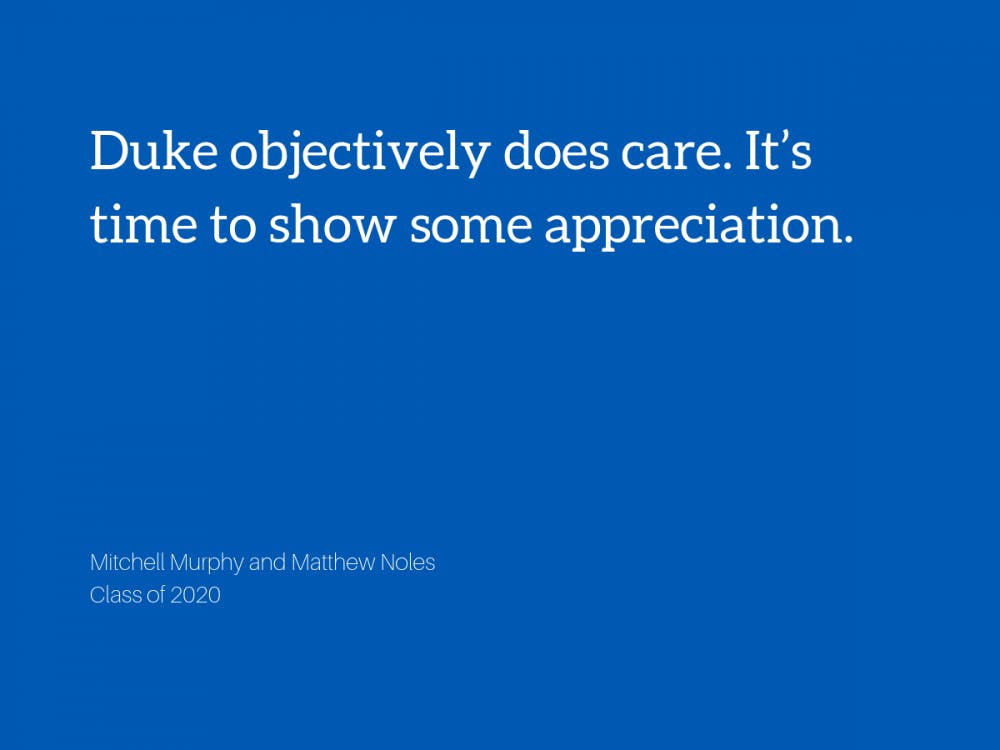Complaining and The Chronicle’s opinion section seem to go hand-in-hand these days. Be it as a platform for cathartic venting or as an outlet for “virtue signalling” to one’s peers, editorials are a convenient forum to demonstrate one’s “wokeness” regarding the shortcomings of the neoliberal economic order and the West Union fish.
One notable iteration of this trend was a recent column that emphatically declared that “Duke does not love us." The author, Gino Nuzzolillo, takes a handful of campus controversies and administrative efforts to impress donors as proof that Duke exists merely to preserve the interests of its most privileged students and alumni. However, the immense resources around us (coupled with administrative efforts to increase and improve those resources through increased fundraising), make it clear that Duke does, in fact, care about us.
Duke is a non-profit institution; not a charity. Yet even though it has no obligation to “love” us, the day-to-day experience at this school overwhelmingly suggests that it does. In the vast majority of its decisions, policies, and resources (e.g. its top-ten ranked financial aid program, world-class healthcare, dining, fitness, and housing facilities, newly built Wellness Center, etc.) the Duke administration’s general “love” for us is clear.
But even if you presume that Duke is as awful and “unloving” as Nuzzolillo suggests, this place is undoubtedly better and more comfortable than most other academic institutions, yet alone the everyday life of most Americans. The luxurious environment, social construction, and day-to-day conveniences on this campus are synthetic creations. An oasis like Duke does not exist in the proverbial “real world.” The thought of a fellow columnist writing a scathing criticism of the university while nibbling on a salmon and kale poke bowl from West Union makes us cringe. We hate to break it to you, but the world we step back into after graduation will offer few improvements.
We do not deny or diminish the hardships that impact many of our peers. There is no doubt that a disheartening number of personal or externally imposed challenges can make attending this school hard. But to assign the brunt of the blame to administrative priorities or a “neoliberal” framework is thoughtless and dishonest.
Likewise, while we don’t tolerate, much less condone, the hurtful words and actions of a select few members, to declare that the administration writ-large doesn’t care about us is in an insultingly broad statement. While there are certainly policy and leadership changes that we would like to see, focusing exclusively on the university’s shortcomings is to lose the forest for the trees.
On a different note, Nuzzolillo’s complaints perpetuate a concerning and well-documented trend of shaming nonprofit institutions and organizations that increase spending on “development” (i.e. soliciting donations). Media outlets and watchdogs lambast charities who have large advertising budgets, much like students mock administrators for building alumni centers or planting new grass on the quads ahead of class reunions. In both cases, the implication is that every dollar not directly spent on fulfilling an institution’s primary goals indicates greed and misplaced priorities.
However, the uncomfortable reality is that most of Duke’s public resources, subsidized services, and substantial year-on-year financial aid grants would not be possible without the generosity of wealthy, donating alumni. Indeed, without the immense financial resources that such donors have brought to bear, Duke’s student body would likely be far more socioeconomically homogenous. Ironically, these very donors—such as David Rubenstein—are consistently criticized in this paper by individuals that are presumably very much in favor of expanding need-based funding and resources.
While disclosures on university development spending are sparse, it’s quite likely that every dollar spent “wooing” wealthy alumni has disproportionately positive effects on the well-being of the entire Duke population. Perhaps the most viable path to reducing Duke’s high proportion of wealthy students, removing loans from financial aid packages, and increasing graduate stipends is by investing in resources that allow us to aggressively court new donations. Perhaps the new grass is the best money we’ve spent in a while.
Moreover, staying true to its mission of developing “leaders in their communities,” it makes sense that the university allows, or even “funnels”, its students into high-paying, high-powered jobs at “notorious” and “gilded” firms such as Apple, Palantir, and McKinsey. At its best, this pipeline allows our alumni to enact positive change over organizations and industries. At minimum, this system produces alumni who can write big checks to the university, checks that could allow many of the proposals favored by campus activists to come to fruition. Regardless, an education and degree from this university is a catalyst for achievement, career advancement, and social mobility for any student attempting to move up the socioeconomic ladder.
Rather than complaining in the face of the university and its donors, critics could better spend their time working with these leaders to help steer the already moving ship in the right direction. But perhaps the perception that Duke does not love us is more a byproduct of unreasonable expectations and a desire to enforce a particular worldview rather than an honest consideration of the environment around us.
Duke objectively does care. It’s time to show some appreciation.
Mitchell Murphy and Matthew Noles are Trinity seniors. Their column “prose and cons” runs on alternate Wednesdays.
Get The Chronicle straight to your inbox
Signup for our weekly newsletter. Cancel at any time.

